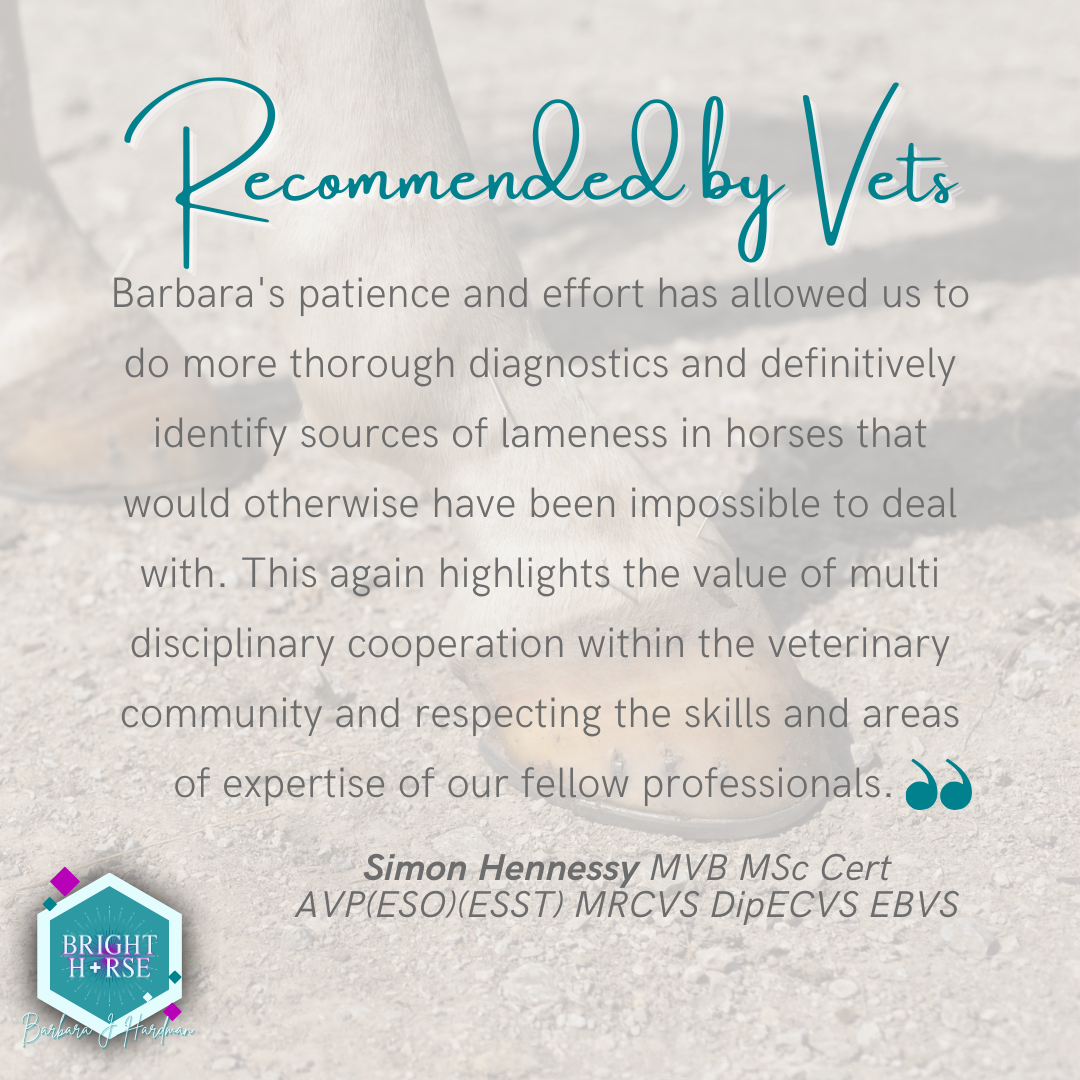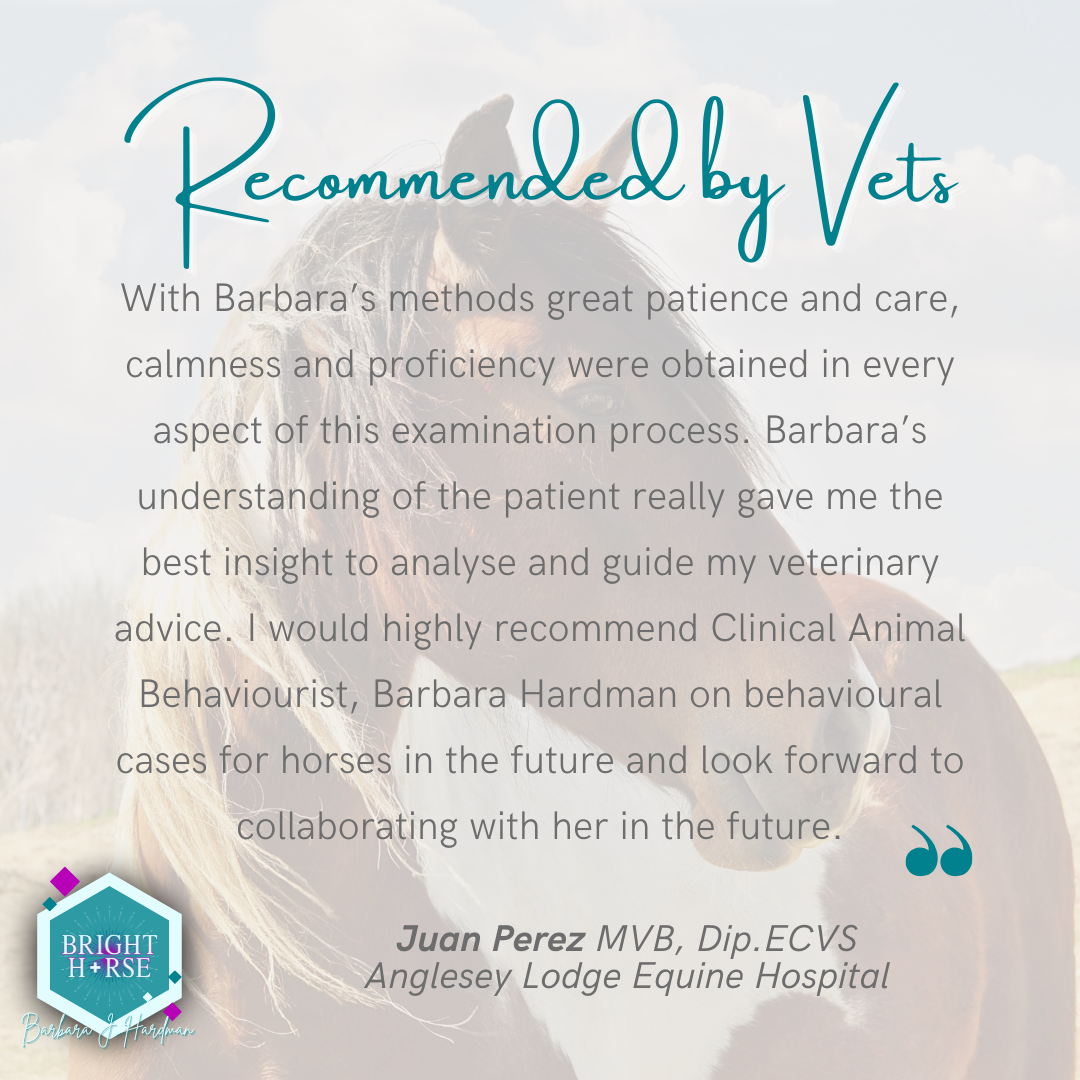Why Choose a Qualified Behaviourist?
Choosing a behaviourist can be difficult, especially in an industry where, despite the ABTC’s formation in 2010, it’s still not illegal for unqualified individuals to offer behaviour services or call themselves a ‘behaviourist.’
This can make it very difficult for horse owners to navigate and find the right professional. Veterinary referral to a Clinical Animal Behaviourist can help guide owners to the appropriate support, ensuring comprehensive and ethical care for their patients.
We know that advice from unaccredited or inexperienced individuals can cause more harm than good, especially when working with horses where unpredictable behaviour can become dangerous very quickly. That’s why it’s so important to refer clients to a fully qualified, accredited professional who adheres to ethical, evidence-based practices.
When you refer a client to me, you can be confident that our patients are receiving expert care grounded in the latest behavioural science & ethical standards
Comprehensive Reporting for Complete Patient Care: I will always provide your practice with a detailed summary report of my behavioural assessment. This ensures that you have a full understanding of your patient’s progress, as well as insights into the behavioural factors contributing to their overall health.
Collaboration for Medical Diagnostics: I will always refer back to you for further diagnostics whenever I suspect that the behavioural issue may be linked to an underlying medical condition. This ensures that no potential health concerns are overlooked in the treatment plan.
Insurance Coverage for Clients: As a Clinical Animal Behaviourist (CAB) accredited by the APBC, most pet insurance policies will cover my fees when referred by a vet. This makes behavioural assessments more accessible to your clients, ensuring they get the support they need without financial barriers.
Ireland does not yet have as comprehensive cover for Equines however this is slowly changing
Working in Partnership for Better Care
As a Clinical Animal Behaviourist (CAB) accredited by the Animal Behaviour Training Council ABTC and a full CAB member with the Association of Pet Behaviour Counsellors APBC , I believe in a collaborative approach between behaviourists and veterinary surgeons. I’m committed to providing ethical, science-backed behavioural solutions that align with veterinary care.
In line with the APBC and ABTC Codes of Practice, I always consult with the client’s registered Veterinary Surgeon before proceeding with any behavioural intervention.
This applies to all clients, including those who contact me directly. Together, we can offer a holistic and thorough service, ensuring both the physical and mental well-being of each patient.
Online Veterinary Referral Process
If you have a client in mind or are struggling to find a Behaviourist to work with, you can contact me directly at any time. You can also submit an online refer and I will get in touch with you directly.
Submit Referral Online
You can now complete an online referral by completeing the form below. I will need to review the patient’s clinical history, but this can be sent via email.
I process all my forms through ‘Brevo’ which adhers to GDPR and my privacy policy, however you are not required to provide patient/client details if you do not wish. If this is the case, please just provide your name, practice details and behaviour you wish to discuss and I will call you back to discuss. Your privacy and the privacy of clients is of utmost importance to me.
How I Can Help Your Clients
I work with a range of behavioural challenges, including but not limited to:
- Aggression (toward people or other horses), including in clinic.
- Behavioural Modification plans to accompany Medical Treatments.
- Handling Issues (including for Veterinary car or Grooming or Farrier).
- Fearfulness, General Anxiety, Reactivity or Other Handling Issues, needle shy.
- Ridden Behavioural Issues (where medical issues have been ruled out)
- General Training issues & Owner Education.
- Other Behaviour Solutions.
Feedback from Referring Vets
“Performing nerve blocks during a lameness assessment on horses with behavioural issues can be a dangerous undertaking leading to injury of the veterinarian or the horse, or both. In most of these cases where needle placement cannot be performed utilisation of advanced imaging techniques such as gamma scintigraphy or bone scans are then required, and in horses with mild chronic lamenesses the sensitivity of such diagnostics is usually reduced. Thus, blocking is best but fighting with a 500kg horse is always going to end with one winner.”
“Barbara’s ability to reduce the behavioural issues of these cases and improve the horse’s acceptance of needle placement for nerve blocks has made the blocking process possible and safer in some of these cases. Her patience and effort has allowed us to do more thorough diagnostics and definitively identify sources of lameness in horses that would otherwise have been impossible to deal with. This again highlights the value of multi disciplinary cooperation within the veterinary community and respecting the skills and areas of expertise of our fellow professionals.”
Simon Hennessy MVB MSc Cert AVP(ESO)(ESST) MRCVS DipECVS EBVS Recognised Specialist in Equine Surgery at Anglesey Lodge Equine Hospital



Learn More About How We Can Work Together
If you’re interested in learning more about my services or discussing a specific case, please feel free to reach out. I’m happy to answer any questions you might have about the referral process or the work we can do together to support your patients.
Contact Me Directly


